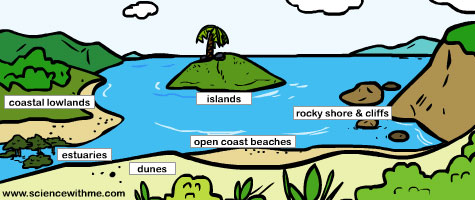The word “ecosystem” is short for ecological system.
An ecosystem is where living creatures thrive within a given area. You can say that an ecosystem is the natural environment where biological organisms such as plants, animals and humans co-exist in this world. So naturally that includes you and me. Yes, we are all members of an ecosystem!
When we say ecosystems, we also think about the location or condition of the surroundings where we exist. So the air that we breathe, the land we walk on, the bodies of water within the area we live in and the heat we get from the sun are all factors that affect ecosystems. An ecosystem must follow a cycle to survive and this chain of events involves producing food and energy for everyone in the ecosystem to use.
You can find ecosystems everywhere, from an aquarium to the Amazon jungle, or the city where you live. A garden can be an ecosystem, and so is the river near your home. The interaction between living and non-living things in a given environment makes up the cycle of life within an ecosystem.
Kinds of ecosystems

There are different kinds of ecosystems depending on the type of surface or environment. Most are naturally made such as the ocean or lake (aquatic or marine ecosystem) and the desert or rainforest (terrestrial). Some are man-made or artificial to encourage co-habitation between living and non-living things in a monitored environment, such as an aquarium or garden.
Because the two are often used together in science, many people get confused about ecosystems and biomes. They mean almost the same, but not quite. An ecosystem is considered a single environment, while biomes are actually several ecosystems interacting with one another. Biomes help preserve the ability of several communities to work together and share resources like food, water and energy for everyone to benefit.
How does an ecosystem work?
Plants make up the biggest group of biological creatures within an ecosystem, and that’s because they are the natural food producers for everyone. Plants raised in the earth need air and collect sunlight to help them grow. When they grow, the plants and its fruits or flowers eventually become a source of food to animals, microorganisms and even humans, of course. Food is then converted to energy for the rest of us to function, and this happens in a never-ending cycle until the living creatures die and decompose back in the earth.
Why are ecosystems important?
Ecosystems are the basis of survival for all living things. We depend on plants and animals for food. In order for us to exist, we need to cultivate and nurture other organisms. We also need to cherish the non-living things within our environment like our air and water so we can continue living as a population. Since plants, animals and humans are all of various species, we all play a role in maintaining the ecosystem.
It’s very important that an ecosystem meets the basic needs of every living thing in order to survive. This means that an ecosystem should have an abundant supply of resources such as food, water, air, sunlight, and habitat for everyone. If the supply is not enough for all organisms, a change such as natural occurring phenomena can bring it back to balance. Losing one’s habitat would mean there is not enough space for everyone, and soon this would mean insufficient food and water. When this happens, most would find it necessary to transfer to another ecosystem to survive. Not being able to find an ecosystem that can provide a natural habitat based on the environment that living creatures subsist in might mean death or worse, extinction (for example, polar bears cannot live in a forest).
What we can do to help protect ecosystems
To preserve our ecosystems, we should stop using too much energy which happens when we consume more than our share of resources. Humans should not disturb the natural habitat of plants and animals, and allow them to flourish for the cycle to continue. Too many people in a habitat can mean displacement: imagine being thrown out of your home because there is no more space for everyone. Worse, overpopulation can also ruin the environment and cause destruction of existing flora and fauna.
We also need to help conserve energy. If the air or water is polluted, and the soil is continuously unearthed (for example, in excessive mining) the ecosystem will slowly die, along with the living creatures within it.
Humans are part of the ecosystem, yet most of the time humans are the single cause of damage to the ecosystem. We should do our part and help maintain a healthy ecosystem so we can continue to co-exist with the rest of the living organisms in a suitable environment.
Learning about ecosystems can help you understand how it greatly affects our lives. You can discover more about ecosystems and science by downloading our free ecosystem worksheet and coloring page to practice what you’ve just learned.
